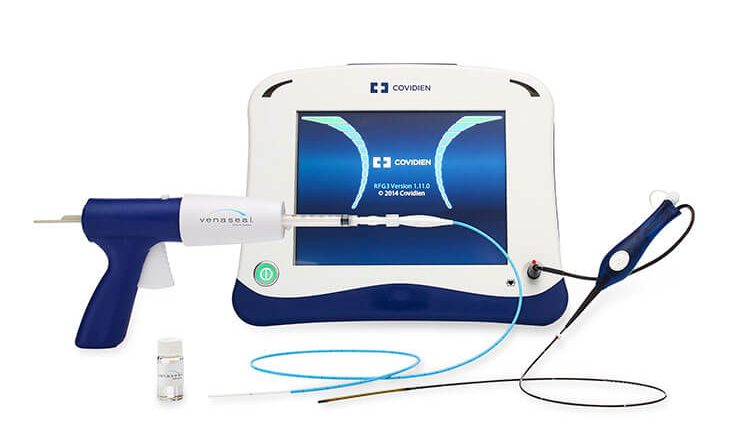
There’s a new treatment for varicose veins that has the medical world abuzz. But that doesn’t mean it’s right for you, says varicose vein doctor in Orlando, John D. Horowitz, MD, FACS, founder and head of Central Florida Vein & Vascular Center, Orlando’s number one place for vascular surgery. The U.S. Food & Drug Administration recently approved the use of the VenaSeal Sapheon Closure System for the treatment of symptomatic varicose veins.
The VenaSeal is a closure system that employs an adhesive that is injected into the diseased vein. Using ultrasound, the doctor guides a catheter through a small skin incision and into the diseased area of the vein. A dispenser then delivers just enough medical “glue” to close the vein. After the affected vein closes, blood re-routes through other healthy veins in the area. The glue then polymerizes, transforming into a solid, which seals off the vein.
In its approval process, the FDA reviewed data that included results from three clinical studies sponsored by the manufacturer. A clinical study of only 108 participants compared to radio-frequency ablation in 114 participants to assess the safety and effectiveness of the VenaSeal system.
While the VenaSeal is a unique, minimally-invasive treatment, adverse effects noted during the trial period included vein inflammation (phlebitis) and burning or tingling (paresthesias) in the treatment regions. What’s more, the FDA determined that the VenaSeal system should not be used in patients who have a known hypersensitivity to the VenaSeal glue, acute inflammation of the veins due to blood clots, or acute whole-body infection.
In addition, Central Florida Vein & Vascular Center’s Dr. Horowitz has other concerns about treating venous disease using the VenaSeal method.
A key concern regards the glue and the possibility that it could inadvertently get into the deep veins, causing a more serious issue in the short term. If the VenaSeal glue entered the deep veins of the legs, it could lead to deep vein thrombosis, a local coagulation or clotting of the blood. And if the glue made it into the lungs, it could cause pulmonary embolism, a dangerous condition in which one or more arteries in the lungs become blocked by a blood clot.
The FDA has warned against use by patients “with a known hypersensitivity”, but that language seems to downplay the additional risks of a potential allergic reaction to some of the ingredients in the glue, such as cyanoacrylate. This could lead to hives, asthma, hay fever, and even anaphylactic shock.
Other potential risks include bruising or hematoma, arteriovenous fistula, bleeding from the site of access, edema in the treated leg, hyperpigmentation, and infection at the access site.
Some of these risks are unique to the VenaSeal system due to the materials used and its implant product design.
There are multiple vein treatment options that are time-tested and proven safe and effective. So if you are suffering from varicose veins caused by venous disease or insufficiency, we invite you to explore the treatment options currently offered by Central Florida Vein & Vascular Center. The following are a description of just two of these options:
Central Florida Vein & Vascular Center is happy to help you figure out which treatment is best for you. We rely on procedures that are not only state-of-the-art, but also are proven safe and effective. You can rest assured that your treatment, regardless of which minimally invasive procedure you choose, will be performed professionally and with your comfort in mind. That’s just how we’ve done things since Dr. Horowitz founded the Central Florida Vein & Vascular Center back in 2001.
A highly skilled varicose vein doctor in Orlando, Dr. Horowitz has dedicated his life and the focus of his practice to becoming one of the pioneers in minimally invasive vein therapy, but he refuses to use his patients as guinea pigs for “flavor of the month” treatments. If and when Dr. Horowitz believes the VenaSeal Sapheon Closure System has proved itself, he’ll certainly consider offering it to his patients.
That’s because Central Florida Vein & Vascular Center provides patient-centric care. From your very first call to us, through your initial consultation, your venous reflux testing, your follow-up office visits, and throughout your vein therapy, you will notice that our practice is different from all the others. Our entire staff is knowledgeable in both venous disease and the procedures we offer, and we specialize in achieving the results you expect.
For more information on your varicose-vein treatment options, call 407-545-3385 today to schedule a consultation at Central Florida Vein & Vascular Center.
From the time this article was first written in 2015, the VenaSeal procedure has come a long way. Dr. Horowitz and Central Florida Vein & Vascular Center is now proud to offer VenaSeal therapy for those who are deemed a good fit for it.
As you can see above, when a new treatment comes out we want to ensure it is fully safe for our patients before offering it. With over 8 years of being on the market, we are confident to safely provide VenaSeal to our patients.
For those who are deemed to be good candidates for VenaSeal, the procedure is safe.
Not sure if you are a good candidate for VenaSeal? When you schedule an appointment with us we help you find the best treatment option for you.